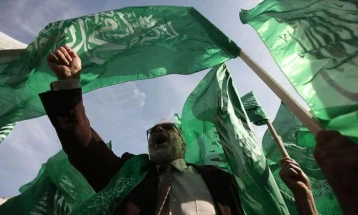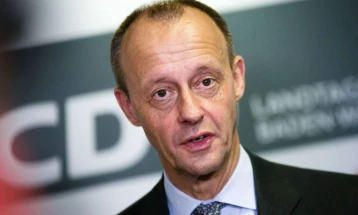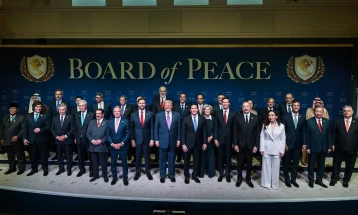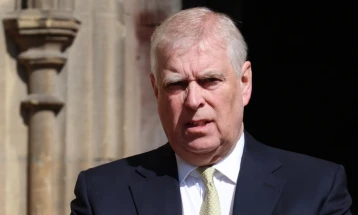Iran launches retaliatory missile strikes at Israel
- Iran retaliated to Israel's large-.scale attacks with waves of missile attacks on Friday evening.
- Post By Angel Dimoski
- 21:26, 13 June, 2025

Tehran, 13 June 2025 (dpa/MIA) - Iran retaliated to Israel's large-.scale attacks with waves of missile attacks on Friday evening.
The Israeli military reported that it had detected Iranian missiles being launched towards Israel, with air raid sirens sounding in several parts of the country.
Shortly afterwards, Iran announced that it had fired hundreds of missiles at Israel, in a statement published by the state news agency IRNA.
It later announced a second and third wave of missiles had been launched. The Islamic Revolutionary Guard Corps (IRGC) confirmed the start of the operation, saying it was targeting dozens of military targets and air bases.
The Israeli military said audible explosions could be heard from air defences or impacts, and called on the population to seek shelter.
Iranian television reported attacks in Tel Aviv and Jerusalem.
According to the Israeli emergency services, there were several injuries.
Israel's large-scale attack on Iran
Iran had vowed to respond to large-scale Israeli airstrikes, which Iranian Foreign Minister Abbas Araghchi said were considered a declaration of war.
Israel's attacks, which began on Friday morning, targeted Iranian cities, nuclear facilities, military commanders and top scientists, eliminating top military figures.
The first wave began in the early hours, with loud explosions rocking the Iranian capital Tehran overnight, state media and eyewitnesses reported. The Natanz nuclear site was also targeted.
Hours later, Iranian media reported that Israel had carried out a new wave of attacks on Iranian territory including on the cities of Tabriz and Shiraz and again at the Natanz nuclear site.
There were reports of new Israeli attacks near the Iranian capital Tehran on Friday evening, with air defences activated in the south of the metropolis, according to the Mehr news agency.
There were also reports of explosions in the western part of the city. These occurred near a popular park and on the outskirts of Tehran, which is home to more than 15 million people.
Later, Israel said its air force had bombed a nuclear facility in Isfahan. Israeli army spokesman Nadav Shoshani confirmed the attack on X.
According to Israeli media, a previous wave of 100 drones launched by Iran towards Israel had been shot down.
Iran vows to 'destroy' Israel
In an evening address on state television, Iranian Supreme Leader Ayatollah Ali Khamenei vowed to "destroy" Israel.
"The armed forces will act with determination and destroy the despicable Zionist regime," the religious leader said.
The Iranian people can be sure that there will be no negligence after the major attack, Khamenei said.
He had earlier threatened Israel with "severe punishment." He said the attacks had exposed Israel's "evil nature more than ever before" and had hit residential areas.
UN Security Council to convene
The UN Security Council said it would convene in New York later on Friday, according to diplomatic sources.
The UN's most powerful body was set to meet at 3 pm (1900 GMT) at the request of Russia, backed by China. The council is usually unable to take decisions regarding the Middle East due to the veto power of Israel's ally, the United States.
Earlier on Friday, Iran had formally requested an emergency meeting of the Security Council.
Several Iranian military figures and scientists killed
Khamenei confirmed the deaths of several commanders and scientists in the Israeli strikes, calling them "martyrs."
The Iranian news agency Tasnim, considered the mouthpiece of Iran's Islamic Revolutionary Guard Corps (IRGC), reported that Major General Hossein Salami, the commander-in-chief of the IRGC, was killed in an Israeli strike on the IRGC's headquarters.
He was considered one of the most powerful men in the Islamic Republic.
The Israeli military later said it had killed the commander of the Islamic Revolutionary Guard Corps' air force, Brigadier General Amir Ali Hajizadeh. The death was confirmed in an IRNA report.
At least six prominent Iranian scientists, including nuclear scientists, and academics were killed in the overnight attacks airstrikes, according to reports from Iran.
On Friday afternoon, Iranian media reported that at least 96 people had been killed by the earlier Israeli strikes. The ISNA news agency reported 18 deaths in the province of East Azerbaijan in the north-west of the country. According to consistent media reports, at least 78 people were killed in the province of Tehran.
Concerns in the Middle East about a possible Israeli attack on Iran had grown in recent weeks, as tensions over Iran's nuclear programme escalated.
At the end of May, US media reported that Israel had already prepared a potential attack on Iran's nuclear facilities.
Netanyahu : Israeli strikes to continue as long as needed
Israeli Prime Minister Benjamin Netanyahu said the strikes were aimed at eliminating the nuclear threat from Iran.
The attack, dubbed "Operation Rising Lion," is to continue "for as many days as it takes to remove this threat," he said in a video published online on Friday.
Defence Minister Israel Katz declared a state of emergency for the country, citing the risk of retaliation.
Israel subsequently announced that it was shutting all of its embassies and consulates around the world.
US says this was an Israeli operation
Soon after news of the strike broke, US Secretary of State Marco Rubio said the United States was not involved, and warned Tehran not to target US personnel in the region in retaliation.
US President Trump called on Iran to quickly conclude an agreement with Washington on its controversial nuclear programme.
"Iran must make a deal, before there is nothing left, and save what was once known as the Iranian Empire," Trump wrote on his social media platform Truth Social. "JUST DO IT, BEFORE IT IS TOO LATE."
Later, Trump said his team had been informed in advance of Israel's plans to attack Iran.
Asked in a telephone interview by US daily Wall Street Journal what kind of heads-up the United States was given before the attack, Trump said: "Heads-up? It wasn't a heads-up. It was, we know what's going on."
Status of nuclear facilities uncertain
The head of the UN nuclear watchdog, Rafael Grossi, informed Israeli President Isaac Herzog on Friday that the Iranian nuclear facility in Natanz suffered "serious damage" in Israel's wide-scale strikes on Iran, a spokesman for Herzog said.
Iranian nuclear authorities said earlier, however, that the strike on the Natanz site had not resulted in any radioactive contamination or chemical leakage.
The International Atomic Energy Agency (IAEA) reported that the radiation levels there were not elevated.
A uranium enrichment plant about 150 kilometres south of the Iranian capital Tehran had not been affected by the wide-scale Israeli airstrikes overnight, according to the IAEA on Friday, as more details emerged about the targeted sites.
Calls for de-escalation
The attacks in an already unstable region has caused concern worldwide.
"Europe urges all parties to exercise maximum restraint, de-escalate immediately and refrain from retaliation," European Commission President Ursula von der Leyen wrote on X.
"This was a unilateral action by Israel," said NATO Secretary General Mark Rutte. "So I think it is now crucial for many allies - including the United States - to work ... to de-escalate."
Russia condemned the "serious escalation of tensions."
Dmitry Peskov, spokesman for Russian President Vladimir Putin, told the Interfax news agency that Putin had been kept informed and that "Russia is concerned about the developments."
Egypt's Foreign Ministry, meanwhile, denounced the Israeli attacks as "a blatant and extremely dangerous regional escalation."
Photo: epa







